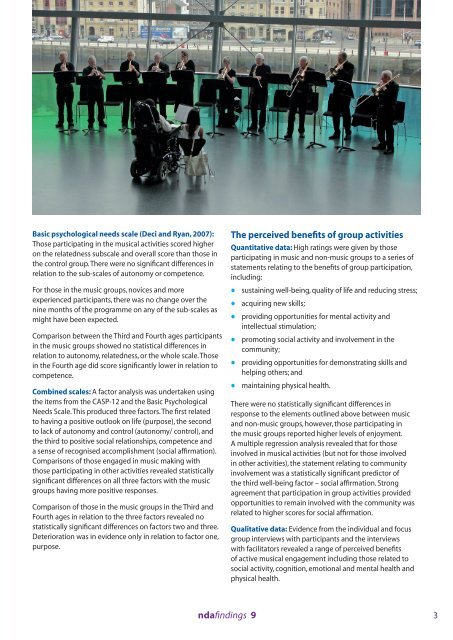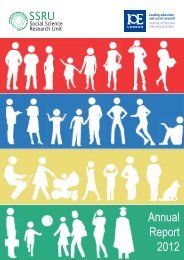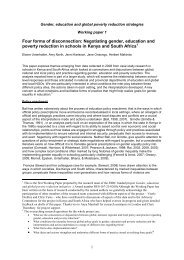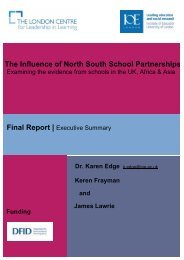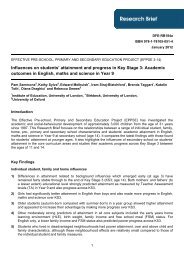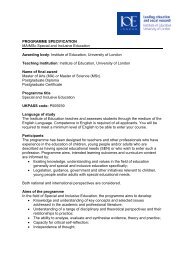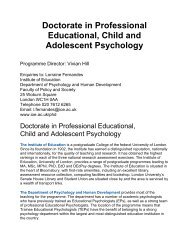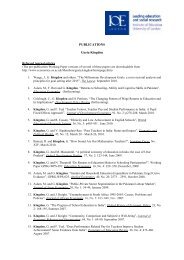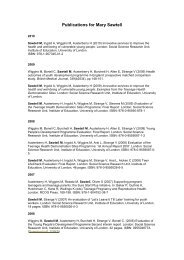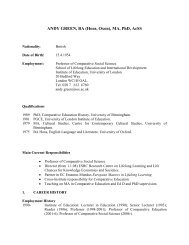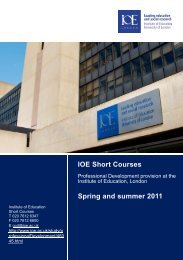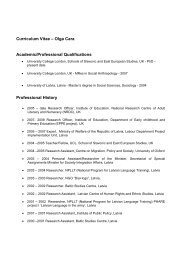nda findings 9 - Institute of Education, University of London
nda findings 9 - Institute of Education, University of London
nda findings 9 - Institute of Education, University of London
You also want an ePaper? Increase the reach of your titles
YUMPU automatically turns print PDFs into web optimized ePapers that Google loves.
Basic psychological needs scale (Deci and Ryan, 2007):<br />
Those participating in the musical activities scored higher<br />
on the relatedness subscale and overall score than those in<br />
the control group. There were no significant differences in<br />
relation to the sub-scales <strong>of</strong> autonomy or competence.<br />
For those in the music groups, novices and more<br />
experienced participants, there was no change over the<br />
nine months <strong>of</strong> the programme on any <strong>of</strong> the sub-scales as<br />
might have been expected.<br />
Comparison between the Third and Fourth ages participants<br />
in the music groups showed no statistical differences in<br />
relation to autonomy, relatedness, or the whole scale. Those<br />
in the Fourth age did score significantly lower in relation to<br />
competence.<br />
Combined scales: A factor analysis was undertaken using<br />
the items from the CASP-12 and the Basic Psychological<br />
Needs Scale. This produced three factors. The first related<br />
to having a positive outlook on life (purpose), the second<br />
to lack <strong>of</strong> autonomy and control (autonomy/ control), and<br />
the third to positive social relationships, competence and<br />
a sense <strong>of</strong> recognised accomplishment (social affirmation).<br />
Comparisons <strong>of</strong> those engaged in music making with<br />
those participating in other activities revealed statistically<br />
significant differences on all three factors with the music<br />
groups having more positive responses.<br />
Comparison <strong>of</strong> those in the music groups in the Third and<br />
Fourth ages in relation to the three factors revealed no<br />
statistically significant differences on factors two and three.<br />
Deterioration was in evidence only in relation to factor one,<br />
purpose.<br />
The perceived benefits <strong>of</strong> group activities<br />
Quantitative data: High ratings were given by those<br />
participating in music and non-music groups to a series <strong>of</strong><br />
statements relating to the benefits <strong>of</strong> group participation,<br />
including:<br />
• sustaining well-being, quality <strong>of</strong> life and reducing stress;<br />
• acquiring new skills;<br />
• providing opportunities for mental activity and<br />
intellectual stimulation;<br />
• promoting social activity and involvement in the<br />
community;<br />
• providing opportunities for demonstrating skills and<br />
helping others; and<br />
• maintaining physical health.<br />
There were no statistically significant differences in<br />
response to the elements outlined above between music<br />
and non-music groups, however, those participating in<br />
the music groups reported higher levels <strong>of</strong> enjoyment.<br />
A multiple regression analysis revealed that for those<br />
involved in musical activities (but not for those involved<br />
in other activities), the statement relating to community<br />
involvement was a statistically significant predictor <strong>of</strong><br />
the third well-being factor – social affirmation. Strong<br />
agreement that participation in group activities provided<br />
opportunities to remain involved with the community was<br />
related to higher scores for social affirmation.<br />
Qualitative data: Evidence from the individual and focus<br />
group interviews with participants and the interviews<br />
with facilitators revealed a range <strong>of</strong> perceived benefits<br />
<strong>of</strong> active musical engagement including those related to<br />
social activity, cognition, emotional and mental health and<br />
physical health.<br />
<strong>nda</strong><strong>findings</strong> 9<br />
3


